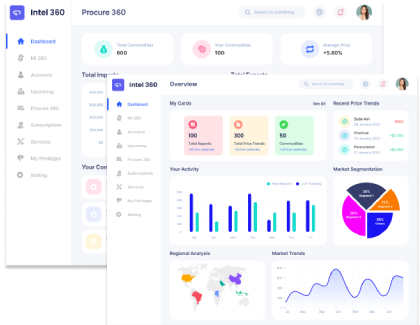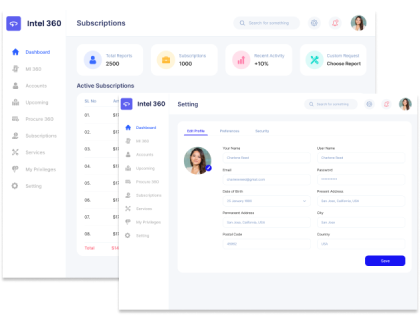In the forecast period, North America is expected to be the largest artificial intelligence market. One of the primary growth drivers in the regional artificial intelligence (AI) market is the increasing investment by major technology companies in developing AI for various applications in a wide range of industries.
The abrupt and disruptive onset of COVID-19 has reverberations across a wide range of industries. Though healthcare, aviation, hospitality, travel and tourism, and other industries have been hit the hardest, other industries such as automobiles, banking, technology, pharma, media, and consumer electronics have also been affected severely. While industries deal with the aftermath of the crisis, some advanced technologies become widely adopted around the world. For the technology sector in general, and Artificial Intelligence in particular, the deadly crisis has opened new vistas of opportunity. While the global economies are on its way to recovery from the crisis, AI is poised to revolutionise various industries through its innovative solutions.
Also Read - Global Artificial Intelligence Market
During the crisis, AI began to play a critical role in mitigating the effects on the healthcare sector. AI has aided in the detection and diagnosis of the virus and the prediction of its evolution and tracking of infection spread. Besides, there are also other wide array of applications of AI technology such as fast-tracking research on drug discovery, slowing down the spread of infection through contact tracing, and assisting in recovery. The technology has also eased administration burden of the sector by automating the processes, organising loads of data, prioritising tasks, and creating automatic clinical notes. This resulted in enhanced ability of doctors and caregivers to focus on treating an increased number of patients. For instance, Alexa can now help users figure out if they've contracted the virus by asking a series of questions about their travel history, symptoms, and possible COVID-19 exposure, according to Amazon. Alexa also gives users advice based on the Centres for Disease Control and Prevention's (CDC) recommendations. Other features include a 20-second song to help people keep track of how long they should wash their hands.
Aside from healthcare, AI has been revolutionising a variety of industries in order to maintain business resilience. Many industries began to digitise their products and services in order to reach potential customers in all possible ways during the prolonged lockdown in order to maintain business continuity. Even online education start-ups have begun to offer personalised services based on the needs and specific requirements of students, indicating that the education sector has begun to embrace AI in a big way. The COVID-19 crisis has brought to light the importance of transforming traditional education into a technology-based system. Apart from changing the learning methodology, AI-powered machines help educators in a variety of ways, including tracking student performance, identifying gaps in teaching techniques, automating administrative tasks, and so on.
AI-enabled chatbots and virtual assistants were also used in the services sector to improve customer service, keep costs down, and answer complex customer questions. To mitigate the crisis' impact and assist customers in need, banks increased their digital outreach to customers. They have switched to remote sales and service teams, as well as a suite of digital tools, new products, and services to help customers manage debt, adjust budgets, and take advantage of new government programmes. The use of online banking and mobile banking rose in the first wave of COVID-19.
Despite the fact that the technology sector has suffered in recent years due to low IT spending, this crisis provided an opportunity for the sector to improve its AI capabilities and assist customers in navigating the crisis. In addition, a few other industries with high end-user touchpoints, such as insurance and retail, are using AI-driven technologies to automate their processes, communications, and improve decision making.
According to a Mckinsey report, pandemic has dramatically catalysed digital transformation and companies have leapfrogged five years forward in consumer and business digital adoption in just few weeks. Organisations have geared up to leverage AI technology at large due to its ability to automate services, boost efficiency, and reduce operational costs. However, in order to meet the needs of the Indian market, India must develop IT platforms that are both Made in India and Made for India. Indian IT companies should come forward to address challenges that are so unique to the country keeping in mind the volume of services required here.
The pandemic has exposed the flaws in our systems, processes, governance, and behaviours in many ways. On the other hand, it has given data scientists and AI scientists an opportunity to put their advanced techniques and tools to work by assisting business leaders in making decisions in a challenging environment characterised by speed, uncertainty, and lack of data.
The majority of people who started using digital channels during the lockdown are likely to keep doing so once things are back to normal. To mitigate the effects of the crisis, businesses are increasingly digitising their products and services. A rise in cloud-based AI services, in addition to the benefits of AI, is helping to fuel the global artificial intelligence industry's growth. Because using Al technology in an on-site data centre is expensive, demand for cloud-based Al products and services has grown. It encourages major public cloud providers to employ their technological expertise to integrate a wide range of Al goods and services into their cloud platforms.
It is estimated that AI will create 2.3 million new job opportunities. Leading Indian academic institutes are partnering with private players to offer a variety of online certificate-based courses in an effort to train participants in relevant technical skills and meet the growing demand for AI professionals. IIT Ropar, for example, has partnered with TimesTSW to offer a 6-month Post Graduate Certificate Programme in Artificial Intelligence and Deep Learning.



















Share